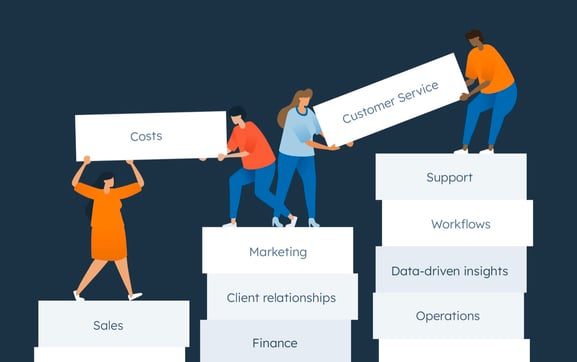If you are looking to make an impact in your business with your SEO strategy, influencer marketing is one of the most efficient techniques to increase reach, engagement and influence traffic and conversions.
The State of Influencer Marketing in 2022 report by Hype Auditor shows that “Global Instagram influencer marketing market could reach $15.2 billion in 2022 and by 2025 this figure could reach $22.2 billion.”
While working with influencers is growing in popularity, this tactic comes with some challenges. With so many questions and myths around this activity, how can SEOs and businesses ensure that influencers have the desired impact on their SEO campaigns?
Get the daily newsletter search marketers rely on.
Before the term “influencer” was so popular, businesses and SEO agencies relied on working with influencers for various reasons. For SEOs, the most important is links.
So, is it still a good tactic to work with influencers? Short answer: yes. Here’s why:
A Kantar study found that 58% of people born between 1995 and 2010 are influenced by reviews when making a purchasing decision.
This generation is a digital native: having grown up with the internet, social media and mobile devices. This has resulted in a hypercognitive generation accustomed to gathering and consuming a wide range of information sources. They take into account virtual and offline experiences.
And reviews, in a way, are a source of experience.
What about SEO? Suppose there is a link within a piece of coverage or review that is relevant to your audience and supports the influencer’s work. In that case, the direct benefits will be on traffic and revenue, aside from others such as brand awareness.
However, as link building evolves, it also becomes how we work with influencers. While there is little question on whether influencers may have a beneficial impact on traffic and SEO, demonstrating the ROI of influencers is still proven to be a challenge.
3 challenges of working with influencers (and solutions)
Challenge 1: Using the wrong metrics to choose influencers
One of the most common issues for businesses when choosing an influencer is using metrics that don’t reveal anything about the influencer and their work.
One of those metrics is Domain Authority (DA) of a website (if you are looking for an influencer who, apart from their social media channels, also has a website).
Domain Authority is an unhelpful metric for evaluating an influencer’s website. DA is a metric invented by an SEO tool provider, and Google does not use it for indexing, crawling or ranking.
Choosing an influencer based on the number of followers is not a substantial metric as followers can be purchased.
Solution: Clear KPI definition
The KPIs behind every campaign with an influencer should be unique.
Many years ago, a popular KPI when working with influencers was to get a link on their blogs. In 2022, business objectives when working with an influencer can be one of the following (or all of them in some cases):
- Traffic.
- Exposure.
- Engagement.
- Quality content.
- Sales.
Working with influencers is exciting. However, there are also a few things to look at to make sure your collaboration reaches genuine people and not fake followers.
When reviewing influencers, it is worth looking at:
- Engagement rate: The ratio of people who see the influencer’s content and the people who interact with it. The tool Grin can help you to calculate that.
- Follower count.
- Monthly impressions
This is not a metric but it is always a good idea to ask the influencer for a collaboration portfolio. This is when an influencer pitches a collaboration to your business, you can request this to have an idea of how they work with other brands.
Useful influencer analysis. Two fantastic tools to help you to find out more insights into your influencers and their followers:
- Hype Auditor
- Sparktoro’s Fake Follower Audit
Remember that the metrics we are looking to influence by working with influencers are traffic, conversions and revenue.
Challenge 2: A result that does not bring any value to anyone
A collaboration that ends with a mention and without a link won’t drive any SEO value for your business or brand.
You ultimately have a temporary story lost among all the other stories (on Instagram, Snapchat, or elsewhere) or posts that won’t bring you any traffic or engagement.
Solution: Clear goals and communication from the start
Determining your goals lets you choose what kind of influencers to work with, types of content, distribution platforms, etc.
However, your broad marketing and business objectives are not for your influencer campaign to meet.
When working with influencers, make sure that your goals are campaign-specific so you aren’t accidentally under-estimating the effectiveness of your campaigns.
Challenge 3: Irrelevancy
Irrelevant content happens when an influencer’s audience doesn’t find the topic of your collaboration interesting, relevant or useful. Most likely, their followers probably won’t even click on it.
Even if your team secures a collaboration with a high-end influencer, you might get a temporary traffic boost. However, any traffic the collaboration drives probably will quickly bounce and is unlikely to convert.
Solution: Choosing the appropriate influencer for your audience
Consumers’ views on influencer content are critical. The most appropriate influencers for your campaigns and audience are more valuable than the amount of followers they might have.
Whether influencer work aligns with brand values, the effect of their work should be evaluated based on quality by analyzing the interaction of their community with the influencers’ content to determine whether their work contributes to shaping customer opinions on a product or company.
Tips to make the best of a collaboration with an influencer
Best practices
When working with influencers, it is important to stay within best practices. This means that your business’s content and collaborations with influencers must include labels such as:
- #AD (advertisement)
- #GIFT (gifted)
- #SPON (sponsored)
In the UK, for instance, the Advertising Standards Authority (ASA) states in its rules and regulations the importance of influencers fully disclosing the nature of their posts to their followers.
If you are working with influencers, creating content on their websites or blogs, then these should be labeled too, especially if the influencer adds a link to your business in their content. Not doing this correctly could violate Google’s Quality Guidelines (link schemes).
Follower count doesn’t matter
Influence isn’t merely a numbers game. When it comes to influencer marketing, size isn’t everything.
Because of their familiarity with the audience and shared interests, influencers with smaller audiences are more likely to generate more engagement.
More brands are working with influencers than ever. The days of only chasing influencers based solely on their follower count and no other metric are long gone.
Relevancy and engagement rate and the rise of the micro-influencer give businesses and brands a plethora of options.
Opinions expressed in this article are those of the guest author and not necessarily Search Engine Land. Staff authors are listed here.






More Stories
The Digital Graveyard in Your Drawer: How Singapore’s Device Buyback Revolution Is Rescuing Millions of Forgotten Gadgets
Shri Ram Global School the Finest Online Learning School in Greater Noida West
What Scriptless Test Automation Means for Software Testing Services Providers